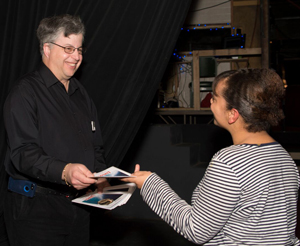
They are most often seen at the theaters, performing front-of-the-house chores—checking coats, dispensing refreshments, passing out playbills, tearing tickets and guiding patrons to their seats. They are usually dressed in smart black-and-white ("full penguin" jackets at the Symphony Center, business casual khakis and henleys at Theater Wit, by request of its owner, Jeremy Wechsler). The majority of them look to be of AARP age, though younger representatives—in particular, students—have been spied wearing the badges identifying them as The Saints.
No, these Saints aren't affiliated with a church, nor with football in New Orleans. This volunteer organization began in 1980 at Chicago's legendary St. Nicholas Theater (where a fledgling playwright named David Mamet was attracting critical attention). A year later, its twelve members lent their assistance to Stuart Gordon's Organic Theater, and as the Off-Loop Theater movement continued to grow throughout the last decades of the 20th century, so did the legions of supporters, compensating for their absence of formal training with unswerving enthusiasm and selfless dedication, asking only for admission to the play as reward for their industry.
It's not all grunt-work for the participants currently numbering over two thousand, however. Since going independent in 1986, membership in the Saints carries with it yearly dues (at present, $75, which equals barely the cost of a ticket to a single downtown show). The accumulated funds are then distributed to small non-profit arts enterprises in the form of grants—not NEA and MacArthur-sized windfalls—though hard numbers are rarely disclosed to the public—but sums sufficient to provide our city's many storefronts and lofts with new lighting or sound equipment, or to pay the salary of equity actors, or, in the case of Evanston's Actors Gymnasium, to replace its ragged, duct tape-patched solarium curtains.
What most fuels the Saints, though, is their love of theater. (Indeed, Doug Bragan, one of the original volunteers, loved theater so much that he bought one, turning Lakeview's Ivanhoe auditorium into a rental multiplex during the 1980s and 90s before reluctantly surrendering it in 2000.)
The Saints' duties frequently bring them into confrontation with disruptions mandating the tact and patience of—well, saints. Tales from the trenches include the usual power failures and recalcitrant patrons—the latter of whom may well be a board officer or generous donor at the same theater where they choose to misbehave. Saints can recall many incidents involving subscribers arriving so drunk as to require ejection, a taxi home, or an ambulance (following a plunge down a staircase), and one remembers a middle-aged couple for whom a darkened balcony provided an opportunity for some teenage-style necking.
 Sometimes the Saints are called upon to perform bizarre tasks, as in an experimental production where playgoers were supplied with shaving-cream pies on paper-plate crusts, which they were then encouraged to hurl at the stage. "The first pie came free with the admission, but additional pies were for sale at a dollar apiece," recounts one of the Saints assigned to manufacture fresh projectiles, "The pies were very topping-heavy, so they rarely traveled more than a foot or two. Very few actors were actually struck that night."
Sometimes the Saints are called upon to perform bizarre tasks, as in an experimental production where playgoers were supplied with shaving-cream pies on paper-plate crusts, which they were then encouraged to hurl at the stage. "The first pie came free with the admission, but additional pies were for sale at a dollar apiece," recounts one of the Saints assigned to manufacture fresh projectiles, "The pies were very topping-heavy, so they rarely traveled more than a foot or two. Very few actors were actually struck that night."
Then there was the show where an actor, renowned for having once halted in mid-performance to scold a playgoer whose cell phone had interrupted his monologue, was spotted in the lobby absorbed in his own mobile you-know-what. The Saint posted thereat issued the standard warning, adding, "I know you don't need to be reminded to turn off your phone." A few minutes into the first act, in what might have been a premeditated stratagem for revenge, the actor's device was heard to ring resoundingly. No fisticuffs were forthcoming on that occasion, but even if they had, order would have been quickly restored by the intrepid and ever-patient Saints.
For more information on The Saints, visit www.saintschicago.org
Mary Shen Barnidge
Contributing Writer

 Follow Us On Twitter
Follow Us On Twitter